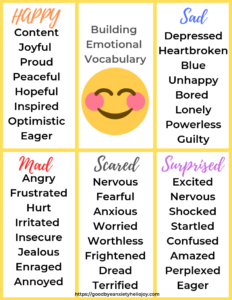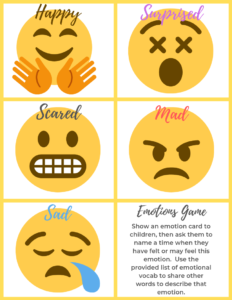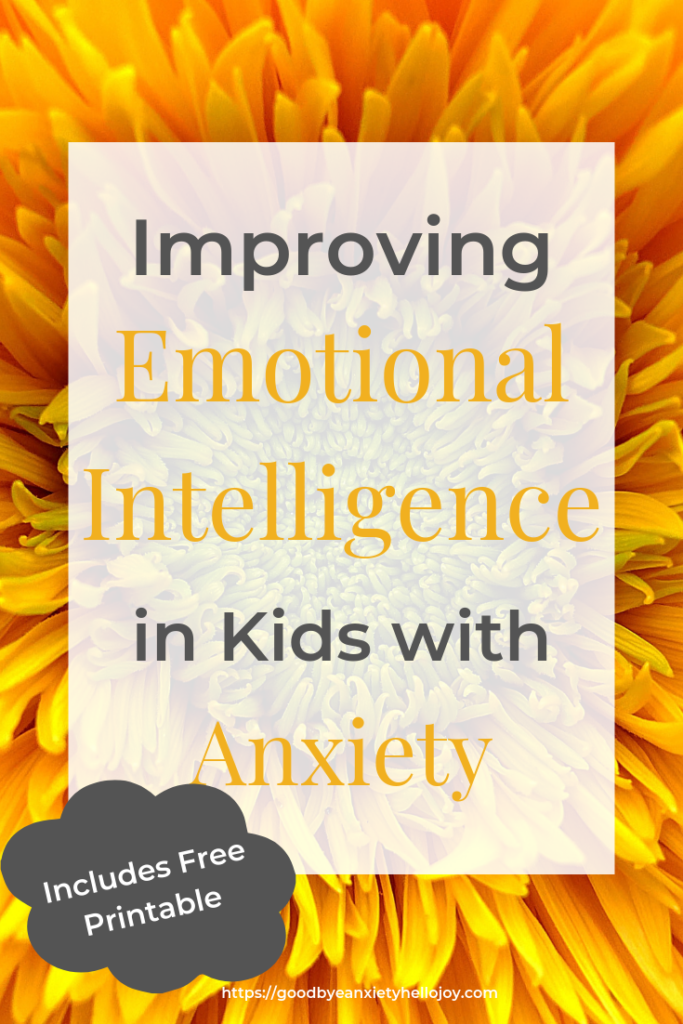Improving Emotional Intelligence in Kids with Anxiety
If your child is suffering from anxiety, he or she may label nearly every emotion as scared or sad, unable to accurately identify or articulate true feelings. Despite feelings of hunger, sleepiness, anger, or jealousy, many anxious children are often habituated to feeling “scared”. Research has shown that improving emotional intelligence in kids with anxiety can help manage the anxiety that they experience. In fact, Daniel Goleman, a leader in emotional intelligence research, has found that emotional intelligence is twice as strong a predictor than IQ scores for success in life. With improved emotional intelligence, children can correctly label their feelings, then apply the learned skills to work through their feelings.
Emotional intelligence refers to the understanding, awareness, and ability to express emotions. Children under the age of 10 use very few emotional words to express their thoughts and feelings. As they grow and mature, they have the ability to use and express a more varied approach to emotions. Clinical psychologist, Rachel K. Tan says, “Being adept in these areas [emotional intelligence] supports kids to interact with others more effectively, encourages stronger and healthier social relationships, and helps them to successfully manage emotionally overwhelming situations by thinking and behaving in ways that help decrease stress levels and bolster their own mental health.”
However, regardless of age, children with anxiety often struggle to identify and express emotions accurately. There are simple ways to help develop your child’s emotional intelligence to help lessen their anxiety.
Why Emotional Intelligence is Important
According to nationally recognized relationship expert and executive coach Dr. Jeffrey Bernstein, emotional intelligence is a key predictor of children’s ability to develop suitable peer relationships, get along at home, develop a well-balanced outlook on life, and reach their academic potential at school. He believes emotional intelligence includes these five areas:
- Self-awareness- knowing your emotions, recognizing feelings as they occur, and discriminating between them.
- Mood management- handling feelings so they’re relevant to the current situation and you react appropriately
- Self-motivation- “gathering up” your feelings and directing yourself toward a goal, despite self-doubt, inertia, and impulsiveness
- Empathy- recognizing feelings in others and tuning into their verbal and nonverbal cues
- Managing relationships- handling interpersonal interaction, conflict resolution, and negotiations
There is no doubt that children with anxiety are often weak in these areas. As a child strengthens their emotional intelligence through open discussions, improved emotional vocabulary, and witnessing those with positive emotional abilities, they too will improve their skills.
Openly Discuss Emotions Using an Expansive Vocabulary
Adults tend to create the idea that some emotions are good, while others are bad. It is important that children (and adults) understand that emotions are neither positive or negative. They are an important part of who we are and how we feel. Many anxious children are so used to feeling “scared” that they label nearly every emotion in the same manner. It is important that they realize they may be feeling sad, hungry, tired, or angry rather than scared. The different emotions, when recognized, allow for different ways of dealing with the emotions. Being scared leads to fight or flight, but other emotions do not typically trigger that same response.
Many children (and adults) stick to basic words to describe their emotions…sad, happy, mad. Yet, there are thousands of words that can be used to describe what we are feeling, offering a more accurate level to our emotions.
As a parent, you can model the use of deep emotional vocabulary by making sure to share your emotions more clearly and accurately. (The list shown below can be downloaded from the freebie library.) As children become used to these words, ask them to share their feelings using their newly acquired, impressive vocabulary.

Similarly, you can create a game (with the included cards below available in the freebie library). Cut the cards apart then show a specific emotion card to children, then ask them to name a time when they have felt or may feel that emotion. Use this fun game to help children really dig deep to find a true experience to match that level of emotion.

Do Not Rescue Children from Difficult Emotional Situations
Emotions serve a purpose and motivate behavior. Sadness can slow a child down while anger can speed them up. While these emotions may not feel good to the child, it does not mean they are bad. They need to learn to tolerate these feelings in order to develop self-awareness.
With the best of intentions, parents swoop in hoping to help an unhappy child return to happiness as quickly as possible. Yet, by doing this, children are learning that these so-called “negative” emotions should not be felt. The reality is that children need to have time to sit with and understand all feelings as they occur. If parents are telling a child not be feeling angry or sad, rather happiness is the desired emotion, it confuses a child. No life is happy all of the time. Therefore, when a child feels something other than happiness, they believe that something is wrong with them.
Similarly, it is important to not allow technology to relive emotions either. When a child is struggling with big emotions, technology can take their mind off of those feelings. Once again, this does not allow a child to learn to recognize and manage their feelings.
Use Children’s Book to Improve Emotional Intelligence in Kids
Children’s books are always a great way to help a child understand a tough topic. Literature allows children to relate to characters and explore experiences in the safety of their home or school. Just like books can help a child understand anxiety, books show children how to handle emotional issues.
Ages 4 and up
I Can Handle It by Laurie Wright
The Way I Feel by Janin Cain
In My Heart by Jo Witek
The Angry Dragon by Michael Gordon
My Mouth is a Volcano by Julia Cook
Today I am a Monster by Trevor Judson and Agnes Green
Alexander and the Terrible, Horrible, No Good, Very Bad Day by Judith Viorst
The Pout-Pout Fish by Deborah Diesen
Ages 8 and up
The Great Gilly Hopkins by Katherine Paterson
Ghosts by Raina Telgemeier
The Red Tree by Shaun Tan
Children need to learn to handle big emotions as a way to prepare for the ups and downs of life. Life is one surprise after another, many of them wonderful, but not all them. Children with anxiety, especially, need to be prepared for the emotions that happen each and every day.
What have you found to help your child navigate the emotions they encounter each day?

Leave a Reply